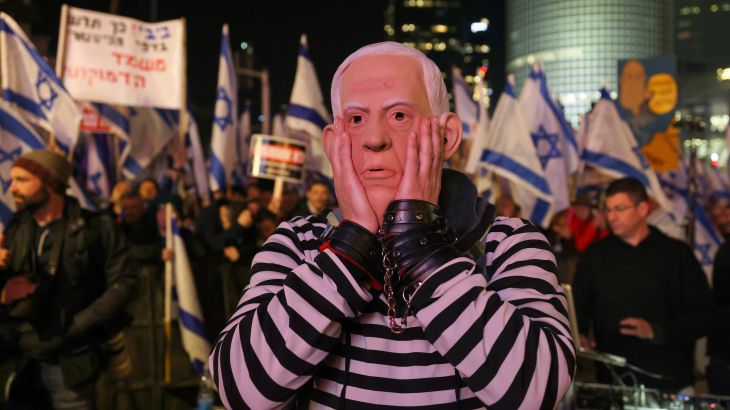UN urges Israel to ‘pause’ controversial legislative overhaul
World body’s human rights chief expresses concern that changes would risk the effectiveness of the judiciary to defend the rule of law and human rights.

The United Nations has urged the Israeli government to “pause” proposed legislative changes currently being considered in parliament, which critics say would weaken human rights protections by undermining the judiciary.
Israel’s parliament, known as the Knesset, on Monday voted to push ahead with a contested overhaul of the country’s judicial system championed by Prime Minister Benjamin Netanyahu’s religious-nationalist government – an overhaul that has sparked mass protests.
Keep reading
list of 4 itemsWhat you need to know about Israel’s judicial reforms
Israelis rally for fifth week against Netanyahu’s judicial plans
Fight over Israel’s judiciary as Palestinians look on
The proposed changes were approved in a first reading. Wielding 64 of the Knesset’s 120 seats, Netanyahu looked likely to win eventual ratification for the two revisions on the agenda – one increasing the government’s sway in choosing judges and the other setting limits on the Supreme Court’s ability to strike down legislation.
On Tuesday, UN High Commissioner for Human Rights Volker Turk said he was concerned the proposed changes would pose serious risks to the effectiveness of the judiciary to defend the rule of law, human rights and judicial independence.
“If passed, these changes risk weakening human rights protections for all, but especially the most vulnerable communities and groups less able to vindicate their rights through representation in the executive and legislative branches of government,” Turk said.
Vulnerable groups include Palestinian citizens of Israel, asylum seekers and LGBTI+ people, among others.
The legislation would give more weight to the government in the committee that selects judges, and would deny courts the right to rule on actions they deem in conflict with Israel’s quasi-constitution.
The proposed changes “would drastically undermine the ability of the judiciary to vindicate individual rights and to uphold the rule of law as an effective institutional check on executive and legislative power”, Turk said, calling on the government “to pause the proposed legislative changes and open them up for wider debate and reflection”.
Before Monday’s vote, protesters posted online videos of themselves trying to prevent lawmakers from Netanyahu’s coalition from leaving for the Knesset. Police said eight people were arrested for disorderly conduct and traffic was rerouted after demonstrators blocked some roads.
Opposition in parliament pledged to “fight for the soul of the nation” while tens of thousands of Israelis gathered in the streets outside, trumpeting their objection.
Government opponents say the proposal would push Israel towards a system like that in Hungary and Poland, in which the leader wields control over all major levers of power.
Critics also say Netanyahu’s nationalist allies want to weaken the Supreme Court to establish more Israeli settlements – considered illegal under international law – on land the Palestinians seek for a state.
The illegal settlements, however, have expanded under successive Israeli governments, with nearly 600,000-750,000 Israelis now living in such areas in the occupied West Bank and occupied East Jerusalem.
Meanwhile, Palestinians say discriminatory laws against them continue to be created and enforced. Last week, Israel passed a new law that will make it easier for authorities to revoke the citizenship and residency of Palestinians in Israel and East Jerusalem.